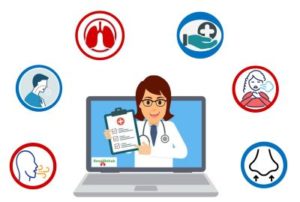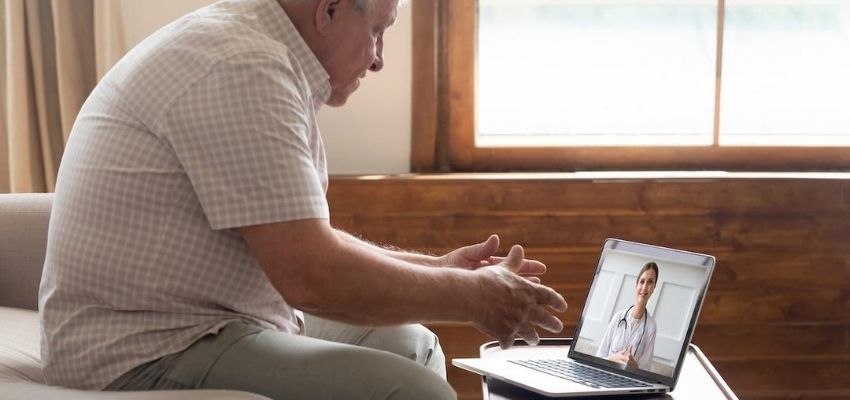A 65 year old Mumbai resident was hospitalized in May 2020 after testing positive for Corona Virus. After 20 days of treatment (pneumonia in both lungs), he was discharged. But he was still reeling with post-viral fatigue and symptoms like breathlessness, tiredness and occasional dry cough. Recovering after Covid was critical. After a 4-week Telerehab with ReLiva’s RespiRehab, he was breathing better (MMRC scale), improved his physical strength and stamina and showed improvement in Oxygen saturation too (SGRQ scale).
Mr Ashok Rajput remarks about his video based TeleRehab, “At first I was skeptical how an online physiotherapy treatment from ReLiva would be. But my thanks to Dr Kimberley Dsouza (PT). She made me feel very comfortable and made me do my exercises step by step. I am grateful to her for helping me recover.”
Exercise is an important part of your recovery from COVID-19, paced to match your needs. As experts in movement and exercise, physiotherapists can guide you in how exercise can help[1]. RespiRehab from ReLiva is an online rehabilitation program, that is personalised telerehab for recovery after Covid-19. World Health Organisation (WHO) suggests that a comprehensive program assists in self-rehabilitation and recovery management, addressing the common residual COVID-19 symptoms, specifically breathlessness, starting exercise and getting back to functional activities.[2]
In order to make the whole process of teleRehab for Recovery after Covid-19, easy to understand for an average person, the treating team of physiotherapists Dr Kimberley D’souza (PT) and Dr Karishma Daswani (PT) retell the treatment process and related challenges and experience in this biography style narrative.
PATIENT HISTORY
I am a 65-year old shopkeeper. My job involves interacting with my customers on a daily basis.
On the 5th of May, I remember feeling a little tired and breathless on my way back home. As the days went by, I began developing a mild fever so I visited my local doctor. He prescribed some general medicines for flu. It was now one week since the first day of my symptoms appearing. I wasn’t getting any better, so my doctor advised me to take a Covid-19 test. My test results came positive on the 18th of May and I got myself admitted to a hospital immediately.
During my hospital stay, I was put in a semi-intensive care setup. Based on my symptoms, I received 3-5 litres of oxygen intermittently. The doctor informed me that I had developed pneumonia in both the lungs. I was in the hospital for a total of 20 days.
On my discharge, I still experienced some fatigue, breathlessness and occasional dry cough.
Medical Note: My oxygen saturation was between 92% to 95% on room air.
I came across tele-rehab services being carried out by Reliva Physiotherapy for Covid-19 patients post hospital discharge. I enrolled for the same to ensure my recovery continued at home.
Rehabilitation with RespiRehab: Consultation
My first consultation was taken on the 22nd of June by Dr. Kimberly D’Souza, a physiotherapist in Reliva’s team of RespiRehab. We connected on a video call and she took a detailed assessment of my condition. 2 things happened on first day:
- She took my detailed history and prepared an impressive treatment program specifically tailored to my needs.
- She explained all the do’s and don’ts that my family and I had to follow, during this period.
Rehabilitation / Treatment Goals:
Based on my assessment, 3 main goals were outlined by the therapist for my recovery after Covid-19, namely:
- Alleviate / lessen the symptoms of breathlessness and cough
- Reduce fatigue
- Gain increase in strength and endurance
Rehabilitation with RespiRehab: Tele Physiotherapy sessions
Tele Physiotherapy sessions for patient start immediately after hospital discharge.
My first treatment session was scheduled for 23rd of June. My therapist made me feel very comfortable and my apprehensions regarding doing exercise were dissolved. She started with simple exercises to resolve my breathlessness. We practiced deep breathing exercises, airway clearance techniques and gradually proceeded to more complex ones. Exercises like ankle pumps, heel slides, single leg raises and mobilization were meant to increase my strength and endurance.
TeleRehab Sessions: How? 
For face-to-face sessions, we will connect on a video call at a pre-decided day and time. Each session lasted approximately 45 to 60 minutes. I was also given access to additional videos for reference so I could do the exercises on my own, later in the day. I would religiously follow the exercises given by the therapist, in the prescribed dosage and frequency. She made me understand that Exercise works like medicine and hence right dosage is as important as the right exercise itself.
All sessions were scheduled at a mutually convenient time. The therapist also actively involved my family in my treatment.
[Refer to the requirements for doing home based RespiRehab Program here]
Rehabilitation with RespiRehab: Keeping track of Progress
Any weekly progress or deterioration in my health was noted and exercises were adjusted accordingly. During my counselling, I came to understand that 2 scales were being used to track my progress.
- MMRC scale for measuring breathlessness
- SGRQ to track my changing health status with respect to quality of daily life.
These are both globally accepted and established parameters to gauge progress of patients specially with respiratory /lung problems and Pulmonary disease.
Rehabilitation with RespiRehab: End Result
After I completed four weeks of tele-rehab with Reliva Physiotherapy’s RespiRehab, I was able to carry out activities that previously would drain me out. I could now climb upto 3 flights of stairs without feeling short of breath.

- Assessment of breathlessness on the MMRC scale suggested an improvement wherein my score dropped down from 3 to 0 (where 3 indicates breathlessness while walking on level ground and 0 indicates no breathlessness except on exercising strenuously as I was told).
- I no longer had any impending symptoms of Covid-19.
- My total SGRQ score dropped to a 14.25 from a prior score of 56.77. (Normal values for SGRQ for the age group of 17-75 should be 5-7, as informed by Dr Kimberly).
I still have room for improvement for which they have advised me further exercises. They will help with muscle strengthening and conditioning, in order to improve existing SGRQ score.
Rehabilitation after Covid-19 (Telerehab): CONCLUSION
I feel safe and confident about my general health condition after taking the RespiRehab program. I now feel much stronger and plan to return to work with positive frame of mind. RespiRehab’s one-on-one approach also helped boost my confidence to carry out activities of daily life (AODL).
Treating cardio-respiratory therapist Dr Kimberley (PT) concludes, “Personalised treatment with RespiRehab has all the advantages of face to face treatment, yet very safe in these times of pandemic.” The Program actually helps the patients to gradually attain functional independence in a very safe and systematic manner, eventually reducing the stress associated with this disease.
References:
[1] PhysioPedia offers information about Physical Activity and COVID-19
[2] Support for rehabilitation self-management after COVID-19-related illness (2020). World Health Organization
